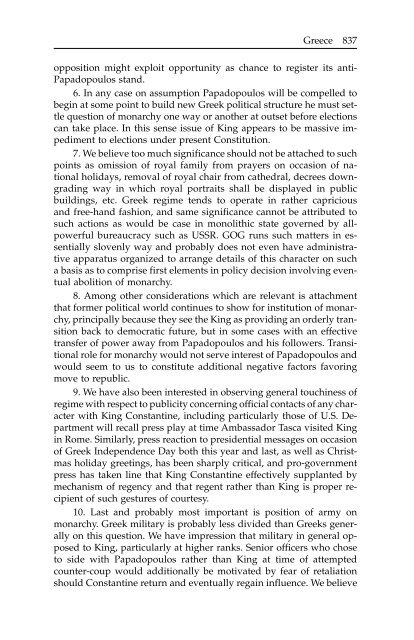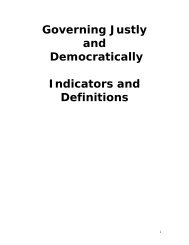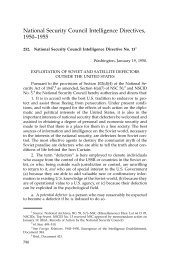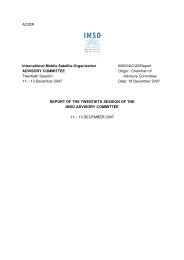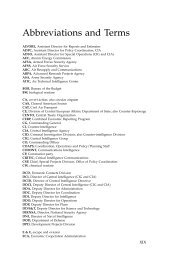Greece - US Department of State
Greece - US Department of State
Greece - US Department of State
You also want an ePaper? Increase the reach of your titles
YUMPU automatically turns print PDFs into web optimized ePapers that Google loves.
<strong>Greece</strong> 837<br />
opposition might exploit opportunity as chance to register its anti-<br />
Papadopoulos stand.<br />
6. In any case on assumption Papadopoulos will be compelled to<br />
begin at some point to build new Greek political structure he must settle<br />
question <strong>of</strong> monarchy one way or another at outset before elections<br />
can take place. In this sense issue <strong>of</strong> King appears to be massive impediment<br />
to elections under present Constitution.<br />
7. We believe too much significance should not be attached to such<br />
points as omission <strong>of</strong> royal family from prayers on occasion <strong>of</strong> national<br />
holidays, removal <strong>of</strong> royal chair from cathedral, decrees downgrading<br />
way in which royal portraits shall be displayed in public<br />
buildings, etc. Greek regime tends to operate in rather capricious<br />
and free-hand fashion, and same significance cannot be attributed to<br />
such actions as would be case in monolithic state governed by allpowerful<br />
bureaucracy such as <strong>US</strong>SR. GOG runs such matters in essentially<br />
slovenly way and probably does not even have administrative<br />
apparatus organized to arrange details <strong>of</strong> this character on such<br />
a basis as to comprise first elements in policy decision involving eventual<br />
abolition <strong>of</strong> monarchy.<br />
8. Among other considerations which are relevant is attachment<br />
that former political world continues to show for institution <strong>of</strong> monarchy,<br />
principally because they see the King as providing an orderly transition<br />
back to democratic future, but in some cases with an effective<br />
transfer <strong>of</strong> power away from Papadopoulos and his followers. Transitional<br />
role for monarchy would not serve interest <strong>of</strong> Papadopoulos and<br />
would seem to us to constitute additional negative factors favoring<br />
move to republic.<br />
9. We have also been interested in observing general touchiness <strong>of</strong><br />
regime with respect to publicity concerning <strong>of</strong>ficial contacts <strong>of</strong> any character<br />
with King Constantine, including particularly those <strong>of</strong> U.S. <strong>Department</strong><br />
will recall press play at time Ambassador Tasca visited King<br />
in Rome. Similarly, press reaction to presidential messages on occasion<br />
<strong>of</strong> Greek Independence Day both this year and last, as well as Christmas<br />
holiday greetings, has been sharply critical, and pro-government<br />
press has taken line that King Constantine effectively supplanted by<br />
mechanism <strong>of</strong> regency and that regent rather than King is proper recipient<br />
<strong>of</strong> such gestures <strong>of</strong> courtesy.<br />
10. Last and probably most important is position <strong>of</strong> army on<br />
monarchy. Greek military is probably less divided than Greeks generally<br />
on this question. We have impression that military in general opposed<br />
to King, particularly at higher ranks. Senior <strong>of</strong>ficers who chose<br />
to side with Papadopoulos rather than King at time <strong>of</strong> attempted<br />
counter-coup would additionally be motivated by fear <strong>of</strong> retaliation<br />
should Constantine return and eventually regain influence. We believe


